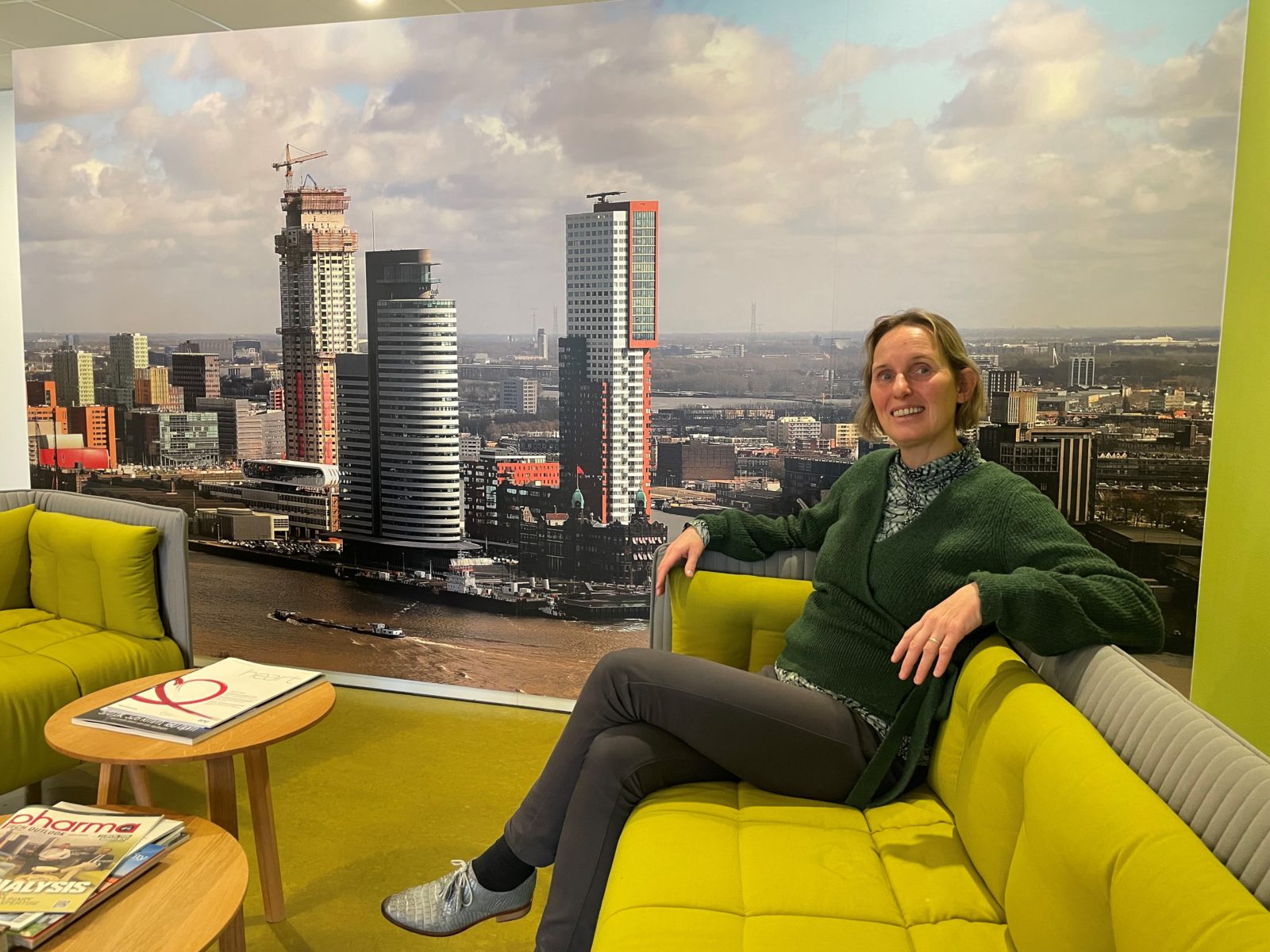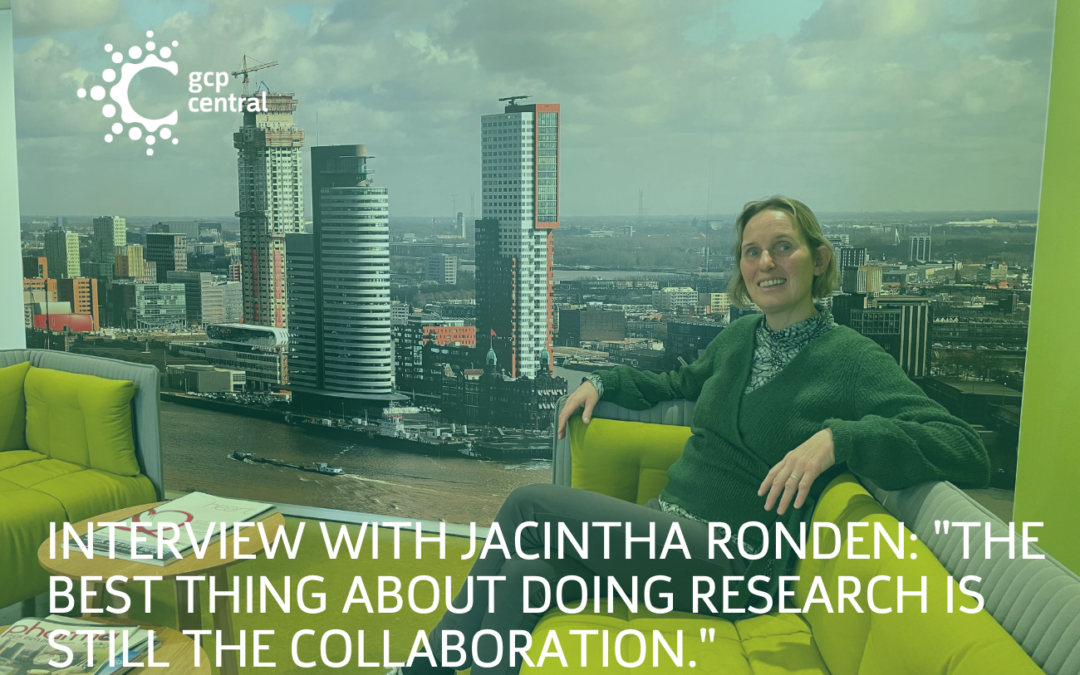GCP Central has now been in existence for more than ten years. It is a time in which we have put all our energy, passion, and dedication into training the international community of scientific researchers on good clinical practice, or GCP, and locally applicable laws and regulations such as the Clinical Trials Regulation (CTR) and WMO. This ensures that scientific research follows applicable laws and regulations for a smooth process from start to finish and, of course, for the safety of participants and patients.
We develop the courses for our clients, for you. We continuously show you what we are doing, what is changing, and where we are going. But how do you experience our training? What is your motivation for research? How do you look at the laws and regulations? Is there resistance? Is the training practical? Is the knowledge gained applicable?
In this interview series, we portray people working in clinical research. This way, we learn from your experiences, but other people’s stories may inspire you. We will visit different research groups, hospitals, CROs, and pharmaceutical companies. We interview people with different roles within the world of science. This series has previously featured neurologist Anne van der Plas of Alrijne Hospital, research coordinator Manon Haanepen of Slingeland Hospital, and GPRI co-founder Jiska Meijer
This time, we spoke to Jacintha Ronden of Cardialysis.

We congratulated her on her promotion from project manager to department manager last week. During a busy period when the transfer had to take place, Jacintha very recently did the blended ICH-GCP and EU CTR training with us, together with her team. About a year earlier, she attended our MDR training to compare the two nicely. Of course, she also talks about her remarkable career, her motivation, and what is involved in doing her job as a researcher in cardiology.
Jacintha started by studying Biological Health Sciences in Maastricht, after which she entered a 5-year PhD track at the Cardiovascular Research Institute Maastricht (CARIM) in the same city. The PhD biochemistry and pharmacology deals mainly with the action of vitamin K. She then makes the step to clinical research. She ends up at the blood bank (now Sanquin) via Parexel Mirai with a secondment at Astra (now Astra Zeneca). The work meets her expectations because collaboration is a big part of these positions. She got her first experience monitoring clinical research, which she enjoys because collaboration is also essential here. So, in 1999, a job application went out to Cardialysis, her current employer.
Cardialysis is an independent and leading CRO (Clinical Research Organization) with complete focus and expertise on research in cardiology. They support all types of studies in the field, medical device studies, biotechnology, and drugs, and provide the complete infrastructure for these trials. The company was founded 40 years ago by cardiologists at Erasmus MC and is housed in a beautiful, central location in Rotterdam. Cardialysis is a global provider of services for the execution of clinical trials and cardiac imaging (Corelab), with customers located mainly in Europe, Asia, and America. The company, of course, continues to serve local Dutch customers and partners. In addition to medical device and pharmaceutical industry assignments, Cardialysis conducts investigator-initiated studies. Cardialysis also contributes to academic research led by key European opinion leaders, mainly in collaboration with the European Cardiovascular Research Institute (ECRI), an academic research organization.
Jacintha has experienced and learned much more in her 24 years at Cardialysis. She came in as a Clinical Research Associate (CRA) and later became a senior CRA. Traveling the world to roll out projects, learning about the agile method during an ICT project, setting up a safety department, Clinical Event Committee, and Data Safety Monitoring Board: it is a small sample of the long list of activities Jacintha has been involved in during her career at Cardialysis. When asked what she enjoys most about her job, she answers, “It’s working together. And that is no surprise, as unconsciously, many of her answers are steeped in the theme of collaboration.
So is the approach to blended ICH-GCP Refresher and EU CTR training. The team does the online modules before a classroom session with Marieke Meulemans, founder of GCP Central and trainer in ICH-GCP and EU CTR. While taking the modules, there is great interest in each other’s progress and much discussion of the content. The modules are followed by classroom deepening, where the trainer extensively addresses questions from the team, and lively talks arise at the table. How can the team best support cardiologists and researchers in designing a study according to the EU CTR, the impact of the new ICH-GCP R2 next year, and the legislation’s translation into daily practice? The training also works as a connecting factor within the team. Tellingly, Jacintha again sought collaboration with her team to prepare for this interview and asked them for additional feedback to share. For example, they appreciate the training format, with a “valuable after-hours day, ” which is a good addition. The nicely structured design of the online EU CTR training is also ‘quite fun, with an interview, a video and then some more formal text.’ On the other hand, one team member found this a bit more challenging and needed more plain text. Due to the many links to in-depth information and Tools, this is overcome in the online training. “All in all, the team spent quite a bit of time with it, although that is inherent to the format. You do want to cover everything when learning about a new legislation.”
And you have to because it’s not just GCP or EU CTR training; these training and efforts lead to certification and qualification. We at GCP Central hope people do not do our training just because accreditation is mandatory. Instead, we like to deliver customized training. And so Jacintha hits the nail on the head by noting, “As a company, we are required to show that you are certified. However, the training timing is even more important and not the same for everyone.” So, how do you put this acquired knowledge to immediate use in practice?
By that, Jacintha also refers to the MDR (medical device regulation) training the team did earlier. That training came at the right time, during the transition from MDD to MDR. Jacintha also appreciated in this training the principle that you go faster through material you have already mastered. She sees our principle that ” what you already know you don’t have to learn” reflected in training and is perceived as very pleasant. The MDR legislation is generally perceived as more complicated than the EU CTR. According to Jacintha, there is still much to be gained if the MDR is structured like the CTR. “It is not always clear what we have to submit as complete. It differs per country (competent authority) and per (central or local) review board. For a study, the central or local review committee follows all or part of the (internationally applicable) MDR and often, in addition, parts of itself. This is, therefore, not unambiguous and also inefficient.
After all, there has already been a lot of cooperation and consultation to arrive at that submission. The sponsors, who ultimately remain responsible for the submission but need the knowledge and expertise of Cardialysis to achieve a good result. There is also intensive cooperation with local (European) freelance CRAs. And, if necessary, with legal advisors to get the contracts in order. It is Cardialysis’s responsibility to inform sponsors about expectations properly when preparing submissions. Some countries are more demanding than others, so a cost-effectiveness assessment must be made when considering the addition of countries where experience shows that more time is needed or the requirements are too high compared to other European countries. “It depends on the study (MDR) article type and the sponsor’s requirements.” When planning the start-up, it is vital to identify the requirements and understand that each European country (still) leads to different timelines and preparation work. “Even with proper preparation and information, there is always room for unexpected requests, and the Cardialysis team helps clients deal quickly.” For an American client, it is sometimes difficult to understand that Europe does not yet act uniformly on submissions, as the FDA does centrally in the United States.
We asked Jacintha what she is most proud of. Again, not surprisingly, she speaks in plurals when she answers, “I am most proud when we(!) can keep a study running well and smoothly.” That means high-quality and GCP and MDR “compliant to successfully achieve the primary point of the study. “But, of course, there isn’t always that.” Unfortunately, it is not uncommon for a study to fail to reach its primary endpoint and stop prematurely.
“Because I’ve been doing this work for so long, I’ve also been able to end studies according to protocol, such as a study I worked on for ten years.” After all the investment, the sponsor was disappointed that the results did not confirm their hypothesis. “This also taught me the importance of site and data monitoring and ensuring all endpoints are reported on time. I am also proud of this study because high-quality work produced a result with new and clear implications for patient treatment.” So, if a high-quality trial design shows that the intervention being studied does not have the hoped-for effect, the result can still be valuable to society. Jacintha had to stand on toes and butt heads in the process of this study, but she can put it into perspective nicely. “It’s almost always nice working together, but such disputes are also part of working together. It can’t always be fun, and you also have to be able to hold each other accountable.”
Jacintha is right at home and has been with Cardialysis for 24 years, which she talks about with enthusiasm and pride. “This company is unique because we are in a niche market (cardiology ed.). You are very broadly involved in your profession, very different from pharmaceutical companies (where roles are much more defined). With us, you are involved in monitoring and study design and supervision of, for example, the clinical event committee and the data safety monitoring board. Sometimes, a piece of data management, or you think along with a statistician, goes deeper, and substantive knowledge is expected of you, including cardiology. The nice thing is that you have more specific knowledge and can talk to doctors on some level. You can give a decent, substantive answer if they ask a difficult question. You can think along, understand the question, and know what is important for the study.” She continues: “In other companies, I might have only been allowed to monitor, and then only manage, but not be involved in the rest of the study activities. What’s unique here at Cardialysis is that your role is and remains so broad. A lot is required of a CRA here.” What about when people want to transition to a career in Cardialysis? ” That transition is pretty big; many study activities are expected of them that they often didn’t do in a previous position.” If you dare to take that step and come to work here, you get a lot of space, for example, to develop processes, make improvements, and do a few more tasks that you enjoy.
Jacintha is proud of her Clinical Operations team, with two clinical trial assistants, 4 CRAs, and four project managers. All are academically trained or have PhDs. All also have side tasks, such as systems management. They all cooperate a lot with other departments, within Cardialysis and outside. Recently, Jacintha became this team’s manager, which means she has new responsibilities like personnel and people management. She is tasked with keeping her people happy. “That doesn’t necessarily mean you have to give them what they want, but that they are happy with their work.” So, will Jacintha stop doing research altogether? “In this role, I am less involved in the design and conduct of studies, but I may continue to do it. I gave this a lot of thought because I enjoy doing research. So first to make my new position my own, and then gladly again!”
We ask Jacintha if she still dreams about anything. She shoots into laughter and answers with a surprising “no.” A lot of people have a path in mind. People come into a company with a specific career plan and are constantly working on the next step and again the next step. I’ve never envisioned that. It’s what you do read that you have to set a goal to know where you want to go. But my experience is also that you get enough challenge and stimulation by being open to new experiences and wanting to develop yourself. Because of that, I’ve done many things here and learned.”
And that by taking on challenges every time, immersing herself in a new role, innovating in cardiology, and working a lot with others. Thus, Jacintha will undoubtedly make this new position her own as well.
Want to know more about Jacintha’s work and Cardialysis? Check out the website of Cardialysis.
Like Jacintha, would you like to train your team in clinical research regulations, such as ICH-GCP, the Clinical Trials Regulation, or the WMO? Then contact us for options for your team.




